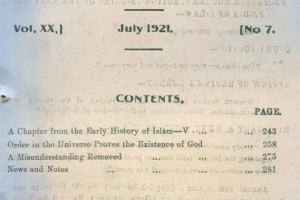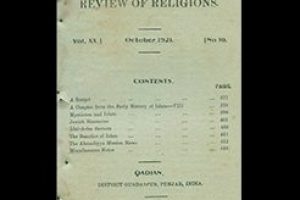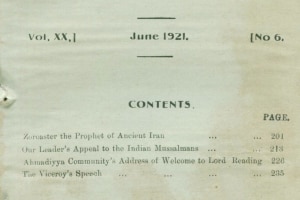
The Review of Religions has begun a monthly series called the “The Hundred-Year Rewind”. We will highlight a particular issue of the Review of Religions from a 100 years ago and offer summaries to some of the articles published in that edition along with a link to the original magazine in PDF form here to read in full.
Christianity versus Islam
In the October issue of the Review of Religions, Mr Abdul Hashem Khan Choudhury MA robustly defended the beautiful teachings of Islam, against some malicious allegations. In the article “Christianity versus Islam”, the author introduced the concept of the spiritual powers of Islam. He divided the elements of spiritual and moral development into several stages including the ideal (the aspiration), the model, the plan, the basis, and the assurance.
The Ideal
The fundamental basis of the path to spiritual progress is to have a clear understanding of one’s spiritual aspirations. The author called this “The Ideal” and explained that the “ideal plays the most important part in all human affairs.” An ideal that is sublime, clearly comprehensible, and in harmony with human nature governs the excellence of all human achievements and endeavours. The ideal of the Christian creed is God and Christians are enjoined to be perfect as their perfect father in the heaven. [1] The definition and description of perfect is vague and not clearly explained. Whereas the Holy Qur’an, right at its beginning presents a full and glorious picture of the ideal sought by the followers of Islam. The author says, “The ideal that Islam desires is enunciated in detail in the first few words of the Holy Qur’an. The Holy Qur’an says, ‘All praise belongs to Allah the Creator and Sustainer of the worlds, the Bountiful. The Generous, the Master of the Day of Retribution;’ [2] The concept given in the Holy Qur’an is that “man is the vicegerent of God on earth.” To become a vicegerent of God, the humans need to appreciate and reflect divine attributes in their conduct and character. The attributes, qualities, and characteristics of God are elaborated clearly in the pages of the Holy Qur’an, these leave no ambiguity about the ideal that one is expected to aspire to. Commenting on the Holy Qur’an, the author said that the explanation of the attributes of God makes an unending theme of the whole discourse, “His praise has been extolled in the abstract, His attributes have been traced in His handiwork and in all His dealings with His creations.” The author described that the attributes of God are explained in such clear details that the human mind can form a rich image of the ideal that it is aspiring to.

He said, ‘… the Holy Qur’an recounts the attributes of God in the abstract but is not content to leave them there. It illustrates and brings home to the reader the operations of each of the attributes by describing its working in the outward phenomena of nature and in human affairs. It constantly repeats them till they become apparent to the dullest intellect and the picture assumes a definite clearness of form essential to make it effective and operative.’
Authors illuminated that the clarity and candour of Divine qualities make them appealing to human nature. A true comprehension of the knowledge of Divine attributes transforms these into a living force that guides and shapes the conduct of believers. The attributes and qualities of God mentioned in the Holy Qur’an “answer the essential nature of man and appeal to all his faculties and evokes the strongest motive for action.”
The model
Once an ideal is envisioned, it is important to realise this concept into a living model. It is well understood that scientific truths require the intervention of the human genius to make them comprehensible to wider humanity. In the same way, moral truths must be personified in a perfect human life to demonstrate that these moral truths can be practised by humans. The author compares the models presented by Christianity and Islam and argues that the Christian model, Jesus, is one that cannot be followed. Firstly, Jesus is presented as “absolutely perfect” and “the equal of God”; a model beyond human capacity. Secondly, not much of Jesus’ life is known to us. We see him in adversity, but not in prosperity. We see him in prison, but not in power. We are unable to learn from him how to treat our parents, wives, children, etc. However, this is not the case with the Islamic model, the Holy Prophet (sa). With regards to this model, the Holy Qur’an says, “Verily, you have in the Prophet of Allah an excellent model.” [3]
The author reported an interesting incidence of him meeting an eminent missionary, who portrayed Jesus as the only sinless person on earth, the perfect man and as such, the son of God. Replying to this notion and contrasting this flawed model with the perfect model of Islam, the author argued:
“If Jesus was absolutely perfect, well might he have saved himself the trouble of visiting this earth, for he was not of this earth, there was no bond of kinship between him and us. We wanted someone to solve for us the problem of reconciling the relative to the absolute. Jesus being absolutely perfect was himself unrealisable by man as much as God. What was then the good of his advent amongst men? On the other hand, the Islamic model is a perfect man – the ‘Superman, as he ought to be. All the moral powers with which a normal man is endowed are developed in him to their fullest possible extent. There was nothing occult about him. He is the same as you or I; developed, guided, controlled to the full of our potential capacity. He presents us with no moral problem intrinsically impracticable or impossible. The path he walked may well be walked by others; the goal he reached may well be reached by others of his own race.”
The author went on to say about the Islamic model, the Holy Prophet (sa) of Islam, “He is one of the best-known historical figures extant. Every small detail of his private and public life, that is worth knowing, has been carefully preserved …. We know about his childhood, his adolescence, his youth, and his manhood. We know him as an orphan, we know him as a citizen, we know him as a general, we know him as a ruler. We can see him in the days of adversity as well as in prosperity, an object of persecution and again conqueror of his enemy. There is no dark corner anywhere and nothing which is most ardent admirer might wish had better been left unsaid.”
The Plan
Having understood the spiritual ideal one aspires to achieve and having seen the model of good deeds, how is one to put this into a plan of action leading to spiritual progress and salvation? The Christian plan for salvation is through faith in Jesus, who came to atone for the sins of men. The author describes this scheme as lacking “in intelligence and imagination and is derogatory to the perfect wisdom and power of God.”
The author then explained that the Islamic concept of salvation is rational and natural. The Islamic belief is that ‘man is born in innocence, in Islam, which is ‘the nature made by Allah in which He has made man.’ [4] He falls through the influence of his surroundings and by outraging his own nature. He can attain salvation only by right knowledge and right actions. There is no special favour. There is no ‘chosen people.’ God has sent teachers or prophets to all nations, who have taught their respective people truth regarding the purpose of human life and the way of attaining the same, or in other words, truths concerning the attributes and ways of God and the human conduct. Salvation is to be achieved by individual effort. ‘No one will bear the burden of another.’ [5] There is nothing occult about the business. When by repeated good actions, man realises the goodness which is his goal, he has already achieved his salvation. Salvation, therefore, is attainable even in this life. When man attains a stage, when evil things and evil thought tempt him no more, when life flows free and all is good, love and duty coalesce and there is a cessation of moral struggle, that in the religious terminology is salvation. In other words, to realise and to love God and to love nothing else. That is the end of human life. That is paradise. Hell is only a temporary process of purification and no eternal damnation…’
The Basis
The basis of Christianity is ‘faith’ in Jesus, the only begotten son of God, having come to atone for the sins of mankind; a concept beyond human experience and therefore, beyond the possibility of human understanding. The author argues, “Did it ever happen that a belief in the prowess of Alexander or Napoleon served to make one a consummate general or an invincible conqueror?”
It is a colossal claim of Islam that this religion has the power to enable one to attain salvation in this very world! How could we be sure that this assertion is not mere words? Does Islam really offer a concrete underpinning to develop spiritual prowess? How can aspiring to reflect attributes of God in one’s deeds and actions lead to salvation? The author delicately handles this complex concept by explaining that the fundamental basis of Islam is ‘knowledge’ or experience. A true faith must be acceptable to human understanding and should be within the range of human experience.
The Holy Qur’an states, ‘Say, ‘Are those who know equal to those who know not?’ Verily, only those endowed with understanding will take heed.’ [6] Expounding on this, the author says, ‘Faith is only the first and necessary stage in the acquisition of knowledge, the assumption which leads to human mind onwards in its search for realisation.’ The author explained this with an example, ‘I have never cooked anything on fire but have merely heard others do the same. I proceed to cook. The action of fire is at this stage a matter of faith to me. When I act upon that faith and succeed in cooking my pot, my ‘faith’, becomes an experience or knowledge. Islam conditions salvation upon certain beliefs and certain actions arising from those beliefs…for example, Islam requires amongst other things a belief in the existence of God’s prophets, or in other words in the fact that God speaks to men in Revelations. Now, revelation, unlike ‘sonship’ is not a fugitive phenomenon. It happened to many a human being in the past and it happens to many in the present time and there is possibility of it happening to us also under proper conditions. ‘Islamic faith’ is in fact … merely the first stage of knowledge, when it is merely an assumption based upon the experience of others. It grows in us in clearness as we make our actions conform to its requirements and ultimately it turns into one of our fully realised experiences.’
The Assurance
The author argues, ‘Christianity has no assurance to offer beyond a mere blind ‘faith’ and ‘hope’ of ultimate salvation…’ Explaining the Islamic concept of assurance and salvation the author says, ‘The certain assurance of salvation, it says, consists in a direct assurance by God himself that the devotee is saved. This assurance is conveyed by divine revelation. God speaks to his chosen one and answers him. Here is an evidence which no other religion, save Islam, is able to produce, and there can, of course, be no question as regards its conclusiveness. Nor must it be supposed that the revelations proposed by Islam are dubious things, results of illusions or hallucinations or the effect of some psychophysical cause. Divine words in order to bring conviction of their origin must possess divine characteristics and hence must evince such qualities as a peculiarly associated with God e.g. Omnipotence, Omnipresence, Omniscience. Prophecies of future events, events which are contrary to all possible calculations based upon the present aspect of things, events of such magnitude as are beyond the possibility of human machinations, such are some of the outside evidence attesting to the divine sources of the revelation. While the subjective experience consists in a deepening of conviction, and an increase in love for God, a moral transformation and a feeling of serenity and peace. Such objective and subjective experiences leave no possible room for doubt that the author of the revelations is any other than the Almighty Creator, in Whose assurance of pleasure consists the surest guarantee of human salvation.’
Did Jesus Die upon the Cross?

Next in the Review of Religions, an article was reproduced from the Times of Ceylon.
It states, ‘Our readers may be aware that one main point of difference between ourselves and our Christian friends is regarding the account of what happened to Jesus upon the cross. According to our Christian friends, Jesus ‘gave up the ghost’ upon the cross and his subsequent reappearance was a supernatural resurrection, illustrative of the general resurrection that was to come. According to us, Jesus did not at all die upon the cross but only swooned. It was a case of syncope. His subsequent revival was a natural recovery from the effects of the shock and injury he received. Readers of the New Testament may well remember that there was no proper examination of the body in the case of Jesus to ascertain whether death had actually occurred, that the witnesses to the alleged death were all simple, credulous and illiterate men of no great intelligence as appears from the other records; that the bones of Jesus were not broken as was usually done in the case of crucified criminals, that blood flowed from the wound when he was pierced on the side with a spear, that the body was not properly buried but left in a room, that when he was seen again by his disciples he was seen in his body and was touched by his disciples and ate food with them. These are all facts as stated in the New Testament itself, whereas the statement that he ‘gave up the ghost’ is merely an opinion of the sacred narrators.’
Under such circumstances, it is compelling to judge that the death of Jesus upon the cross has no conclusive evidence in the New Testament, or in any other narrative.
The author then used the testimonies presented for mistaken death to explain that in some exceedingly rare cases the border of life and death is blurred and even in expert hands, a living individual can be mistaken for dead. This can lead to premature burial. In the article, it was mentioned:
‘A lady who died recently in England left instructions in her will that her spinal cord should be severed before burial. The chances of premature burial are extremely remote, for in the vast majority of cases the change from life to death is obvious, and the moment when the change occurs can be stated with certainty.” Then author goes on to explain that such changes, in some rare instances are not so clear cut, by saying ‘…Cases of suspended animation and of syncope are not uncommon, and they may be complete enough and last long enough to give an appearance of death even to a medical man. There are well authenticated instances on record of both children and adult having been restored to life as much as 24 hours after life had been pronounced extinct, and in some countries the possibility of suspended animation is legally recognised. In France there must be an interval of 24 hours and in Germany of 48 hours between death and burial.’ The article went on to explain, ‘Premature burial, if it ever does occur or has occurred, is due to the failure of the two simplest and generally most sure test – the heart-beat and the breathing. In suspended animation the breathing may become imperceptible even to the test of a mirror held over the mouth and nostrils, and in syncope the heart’s action may become so feeble that neither the stethoscope nor the ear placed on the chest (which is the better method) can detect it. To make sure by this test it is necessary to listen for the heartbeat and respiration for five minutes, and then after an interval, for another five minutes. Hence, if there is any reason to suspect suspended animation or syncope, other tests are necessary. There are many possible tests but very few that are really conclusive on the moment.’
The article then mentioned various tests such as litmus paper test, position of the eyeball, injection of fluorescein and the body temperature. This article presented truly clear evidence that the New Testament does not describe the death of Jesus (as) on the cross as a fact and no eyewitness account confirms that Jesus (as) died on the cross. Ahmadi Muslims believe that Jesus (as) was in a state of deep unconsciousness and was mistaken as dead. The article purports to say that the mistaken diagnosis of death is a recognised phenomenon, lending support to the Ahmadiyya beliefs about the life of Jesus (as).
The London Mosque
The plan of the proposed mosque in London is under consideration. The scheme includes a mosque, quarters for missionaries, guestrooms, lecture rooms, a yard, a tennis court. In this connection, we give below the translation of an Urdu couplet from the pen of Hazrat Mirza Bashiruddin Mahmud Ahmad (ra), Khalifatul Masih II.

ENDNOTES
- https://www.biblegateway.com/passage/?search=Matthew%205%3A48&version=KJV
- The Holy Qur’an, chapter 1, verse 2-4.
- The Holy Qur’an, chapter 33, verse 22.
- The Holy Qur’an, chapter 30, verse 31.
- The Holy Qur’an, chapter 35, verse19.
- The Holy Qur’an, chapter 39, verse 10.




Add Comment